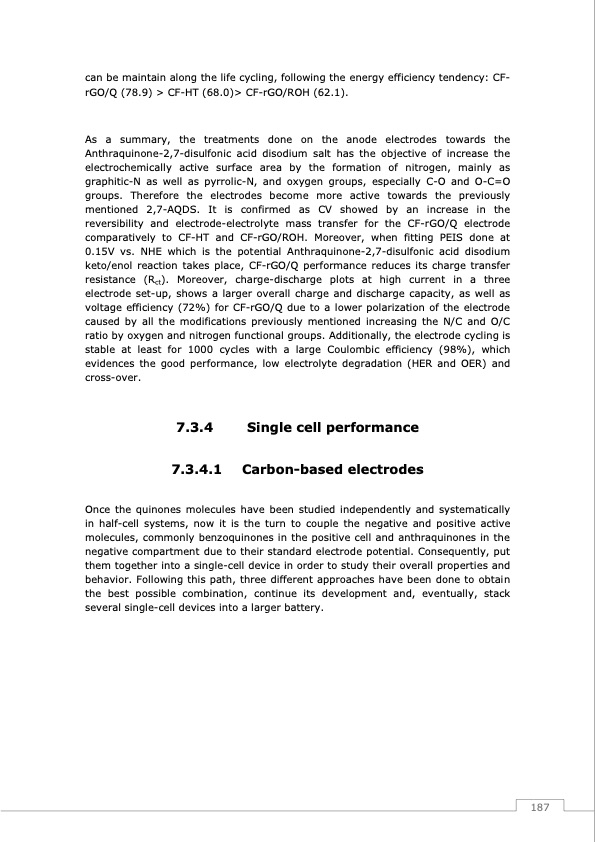
PDF Publication Title:
Text from PDF Page: 188
can be maintain along the life cycling, following the energy efficiency tendency: CF- rGO/Q (78.9) > CF-HT (68.0)> CF-rGO/ROH (62.1). As a summary, the treatments done on the anode electrodes towards the Anthraquinone-2,7-disulfonic acid disodium salt has the objective of increase the electrochemically active surface area by the formation of nitrogen, mainly as graphitic-N as well as pyrrolic-N, and oxygen groups, especially C-O and O-C=O groups. Therefore the electrodes become more active towards the previously mentioned 2,7-AQDS. It is confirmed as CV showed by an increase in the reversibility and electrode-electrolyte mass transfer for the CF-rGO/Q electrode comparatively to CF-HT and CF-rGO/ROH. Moreover, when fitting PEIS done at 0.15V vs. NHE which is the potential Anthraquinone-2,7-disulfonic acid disodium keto/enol reaction takes place, CF-rGO/Q performance reduces its charge transfer resistance (Rct). Moreover, charge-discharge plots at high current in a three electrode set-up, shows a larger overall charge and discharge capacity, as well as voltage efficiency (72%) for CF-rGO/Q due to a lower polarization of the electrode caused by all the modifications previously mentioned increasing the N/C and O/C ratio by oxygen and nitrogen functional groups. Additionally, the electrode cycling is stable at least for 1000 cycles with a large Coulombic efficiency (98%), which evidences the good performance, low electrolyte degradation (HER and OER) and cross-over. 7.3.4 Single cell performance 7.3.4.1 Carbon-based electrodes Once the quinones molecules have been studied independently and systematically in half-cell systems, now it is the turn to couple the negative and positive active molecules, commonly benzoquinones in the positive cell and anthraquinones in the negative compartment due to their standard electrode potential. Consequently, put them together into a single-cell device in order to study their overall properties and behavior. Following this path, three different approaches have been done to obtain the best possible combination, continue its development and, eventually, stack several single-cell devices into a larger battery. 187PDF Image | Redox Flow Batteries Vanadium to Earth Quinones

PDF Search Title:
Redox Flow Batteries Vanadium to Earth QuinonesOriginal File Name Searched:
FJVG_TESIS.pdfDIY PDF Search: Google It | Yahoo | Bing
Salgenx Redox Flow Battery Technology: Salt water flow battery technology with low cost and great energy density that can be used for power storage and thermal storage. Let us de-risk your production using our license. Our aqueous flow battery is less cost than Tesla Megapack and available faster. Redox flow battery. No membrane needed like with Vanadium, or Bromine. Salgenx flow battery
| CONTACT TEL: 608-238-6001 Email: greg@salgenx.com | RSS | AMP |